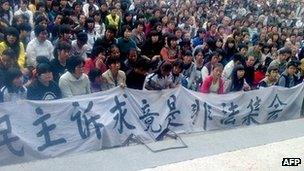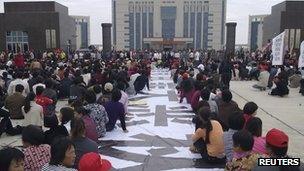Wukan unrest: Why do Chinese farmers riot?
- Published

Images supplied by villagers show large rallies in Wukan
The protest that has erupted in a village in China's Guangdong province has grabbed headlines around the world, but the issues at the heart of the dispute are alarmingly commonplace.
Every year, China is plagued by tens of thousands of "mass incidents" - a catch-all phrase that the government uses to describe riots, protests and strikes.
Many are about land rights. Villagers often accuse local officials of taking their land without offering proper compensation.
But corruption in local government - an issue China's top leaders readily admit to - is only one part of the problem.
China's property laws also seem to create conflict because they largely deprive farmers of the right to control the land they work.
And if there are disagreements, they can easily result in angry demonstrations, organised by villagers who often feel they have no other option.
The stand-off between local people and the authorities in the village of Wukan over land rights is a common dispute.
Some believe the central problem is that there is no private land ownership in China - it is all, in effect, owned by the government.
Farmers are simply allocated land for a set period of time.
Eva Pils, an associate professor at the Chinese University of Hong Kong, said this puts too much power in the hands of local governments.
"This can lead to corruption and abuse of power," said Ms Pils, who has studied the issue.
Revenue stream
One problem is the level of compensation given to farmers for expropriated land, which is based on the amount of money a farmer can earn from it - not on the higher value local officials get when they sell it.
Ms Pils said some Chinese researchers have estimated that villagers can get as little as 5% of the value of the land in compensation.

Farmers often feel they have no choice but to protest about their grievances
This seems an obvious source of discontent among villagers.
But persuading local governments not to sell off farmland is tricky, partly because they get so much of their income from it.
Economists estimate land sales account for up to a third of local government revenue.
Disputes rife
Some local authorities, such as in the city of Chengdu, have begun programmes that give farmers more legal rights over farmland.
This allows them to benefit if their land is earmarked for development.
China's land ministry believes this is a key part of protecting farmers' rights.
"The lack of legal proof on rural land ownership has left farmers' interests poorly protected," said an article on this issue published by China's state-run news agency Xinhua.
The ministry uncovered 37,000 cases of illegal land use in China in the first nine months of this year, according to Xinhua.
But why do so many land disputes result in conflict with the authorities?
The answer to that question may lie in China's determination to maintain social stability by cracking down on anyone who could undermine it.
The Communist Party believes this is an essential tool in maintaining power.
Rigid stability
Yu Jianrong, one of China's leading rural researchers, said that in many cases this means "normal expressions of public will are branded as illegal behaviour".
Farmers who complain about land grabs often find no sympathy from the local authorities, the courts or the police - and sometimes are themselves accused of stirring up trouble.
"Rigid stability is about defining absolute social calm as the objective of governance," wrote Mr Yu in an article carried by the China Media Project, a Hong-Kong-based centre that monitors the media in China.
"[The authorities see] each and every act of resistance as disorder and chaos, all to be struck down and suppressed through whatever means possible."
In these circumstances it is not hard to see how minor disputes over land can quickly spiral out of control.
It is difficult to calculate exactly how many "mass incidents" occur in China every year because the government is reluctant to release figures.
A report by the Chinese Academy of Social Sciences released this year quoted figures of up to 60,000 a year, but it only referred to data for the decade between 1993 and 2003.
Other Chinese academics suggest there could have been up to 180,000 mass incidents last year.
Whatever the figures, the fact that the government is coy about releasing them suggests they are embarrassingly high.
- Published14 December 2011
- Published12 December 2011
- Published25 September 2011
- Published14 June 2011
- Published5 March 2011